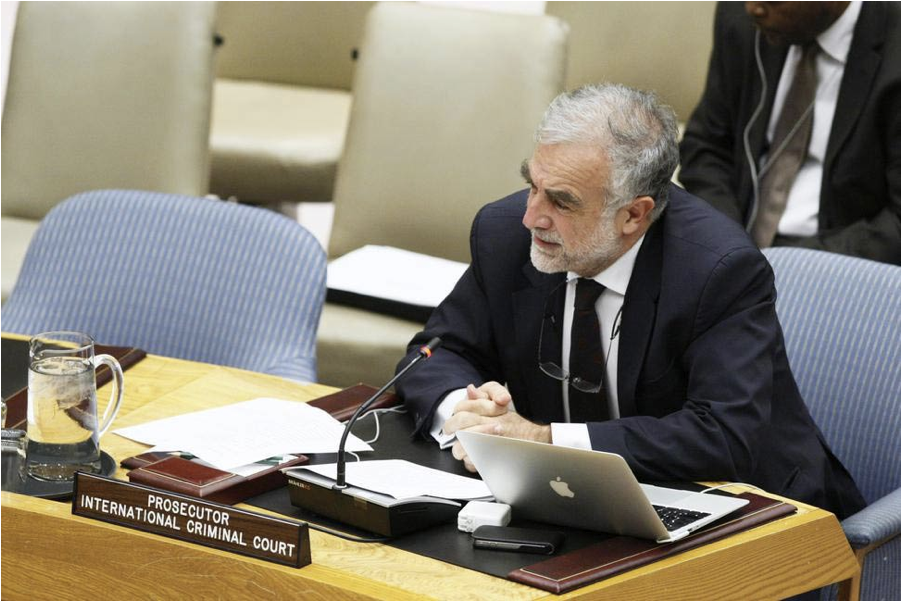BRIEFING: ICC Prosecutor Briefs UN Security Council on the Situation in Darfur
Summary by the PeaceWomen Project Security Council Monitor
On 5 June 2012, Luis Moreno-Ocampo, the Prosecutor of the International Criminal Court (ICC), briefed the Security Council on the situation in Sudan. Following the briefing, all 15 members of the Security Council and the Permanent Representative of Sudan to the United Nations issued statements.
This was the 15th briefing on the situation in Darfur delivered by ICC's Office of the Prosecutor to the Security Council since the Council's referral of the situation to the ICC in 2005. Mr. Moreno-Ocampo drew attention to the pending arrest warrants against Sudan's President Al-Bashir, government minister Ahmed Harun, militia leader Ali Kushayb, and defence minister Abdel Raheem Muhammed Hussein.
“A Direct Challenge to the Council's Authority”
In his briefing, Mr. Moreno-Ocampo asserted that the Court has fulfilled its judicial mandate through its collection of evidence and indictments of those deemed most responsible for the situation in Darfur. He stressed that the “current challenge is their arrest,” noting that President Al Bashir has used his position of power to secure impunity for himself and for those who have followed his instructions. Mr. Moreno Ocampo stressed that the whereabouts of the four fugitives in the ICC's Darfur cases are known and that the Government of the Sudan's refusal to arrest these individuals constitutes “a direct challenge to the Council's authority.”
 Daffa-Alla Elhag Ali Osman, the Representative of the Sudan, responded to these concerns by dismissing the referral of the situation in Darfur to the International Criminal Court as an illegitimate, politically-driven campaign. Mr. Osman also urged that Mr. Moreno-Ocampo, serving as the Prosecutor of the ICC, has acted without accountability, based on false information, and with personal and political motives. He argued that Darfur is currently living in peace and security, having implemented the Doha Peace Accords.
Daffa-Alla Elhag Ali Osman, the Representative of the Sudan, responded to these concerns by dismissing the referral of the situation in Darfur to the International Criminal Court as an illegitimate, politically-driven campaign. Mr. Osman also urged that Mr. Moreno-Ocampo, serving as the Prosecutor of the ICC, has acted without accountability, based on false information, and with personal and political motives. He argued that Darfur is currently living in peace and security, having implemented the Doha Peace Accords.
Mr. Moreno-Ocampo firmly disagreed with this notion, highlighting that the perpetration of crimes against humanity, war crimes, and genocide have not stopped. This sentiment was echoed by various representatives, including those of the United Kingdom, the United States, and France.
Addressing Sexual Violence in Darfur
Several representatives drew attention to the gendered impact of the current situation in Darfur. The UK and the United States emphasized that the recent reports of sexual violence against women are cause for increased support for the ICC's efforts. Portugal also referenced a statement made by Margot Wallstrom, the Special Representative of the Secretary General on Sexual Violence in Conflict, which declared that the sexual and gender-based crimes in Darfur continue to occur and have gone unpunished.
The ICC and Women, Peace and Security
As these representatives implied, executing the arrest warrants issued by the ICC offers an opportunity to end impunity for the widespread gender crimes that have occurred in Darfur. The ICC's indictments related to the situation in Darfur include counts of rape as a war crime and as a crime against humanity.
The Rome Statute, which established the ICC, was the first international treaty to codify many of the forms of violence women experience in conflict situations, including rape, sexual slavery, enforced prostitution, forced pregnancy, forced sterilizations, sexual violence, gender-based persecution, and trafficking, as crimes against humanity, war crimes, and in some instances, genocide.
The recognition of gender-based crimes as atrocity crimes is not the only way in which the ICC values gender. When the ICC was designed in 1998, serious attention was paid to ensure that court procedures are gender sensitive, that the staff have expertise in issues pertaining to gender-related violence, and that the hiring practices aim towards equal gender representation for judges and staff.
As Under-Secretary General and Executive Director of UN Women Michelle Bachelet noted in her April briefing to the Security Council, "Prosecutions are crucial for the credibility of efforts to re-assert the rule of law after conflict," and "this accountability must include effective prosecutions of war crimes against women and adequate redress." Continued support for the ICC's efforts in Darfur should be encouraged.
For more information on the briefing, read the UN Press Release.
